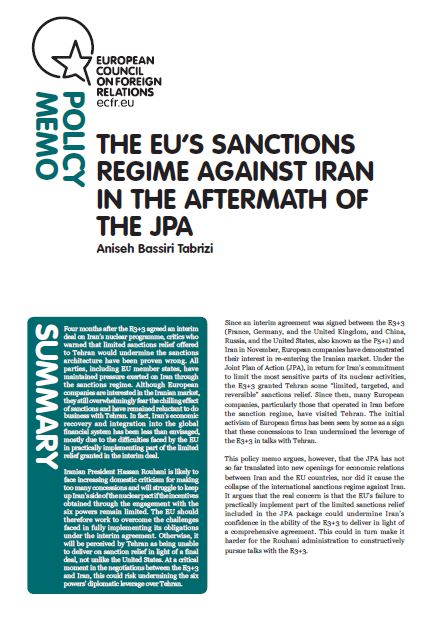The EU’s sanctions regime against Iran in the aftermath of the JPA
Framing concerns and assessing risks
Months after the E3+3 agreed an interim deal on Iran's nuclear programme, critics who warned that limited sanctions relief offered to Tehran would undermine the sanctions architecture have been proven wrong.
Analysis by ECFR's Middle East and North Africa Visiting Fellow, Aniseh Bassiri Tabrizi, examines how all parties, including EU member states, have maintained pressure exerted on Iran through the sanctions regime. The Joint Plan of Action (JPA) has not caused the sanctions regime to unravel nor a European commercial rush back into the Iranian market. Although European companies are interested in the Iranian market, they still overwhelmingly fear the chilling effect of sanctions and have remained reluctant to do business with Tehran. In fact, Iran's economic recovery and integration into the global financial system has been less than envisaged, mostly due to the difficulties faced by the EU in practically implementing part of the limited relief granted in the interim deal.
The ECFR policy brief highlights the difficulties faced by Europe in delivering the limited concessions granted to Iran under the interim nuclear deal. Tabrizi's paper warns that the challenges faced by Europe in delivering their obligations under the interim deal could ultimately undermine the future of the nuclear talks by:
-
Reducing President Rouhani's domestic standing, his flexibility to negotiate and his ability to showcase the benefits of reaching a final deal
-
Eroding Tehran's confidence in the E3+3's resolve to re-establish Iran's international financial links should a final agreement be reached
- Damaging the E3+3's diplomatic leverage over Iran
Rouhani is likely to face increasing domestic criticism for making too many concessions and will struggle to keep up Iran's side of the nuclear pact if the incentives obtained through the engagement with the six powers remain limited. The EU should therefore work to overcome the challenges faced in fully implementing its obligations under the JPA. Otherwise, it will be perceived by Tehran as being unable to deliver on sanction relief in light of a final deal, not unlike the United States. At a critical moment in the negotiations between the E3+3 and Iran, this could risk undermining the six powers' diplomatic leverage over Tehran.
The European Council on Foreign Relations does not take collective positions. ECFR publications only represent the views of their individual authors.



